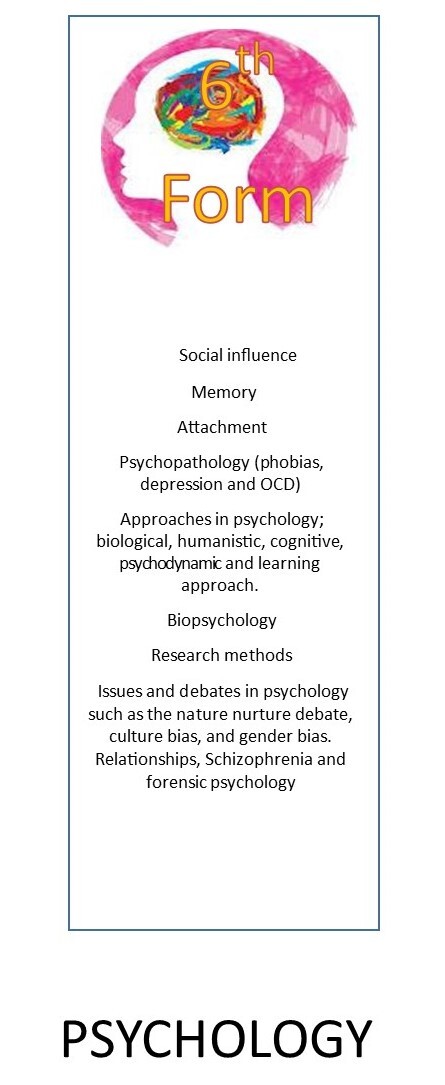- Home
- Sixth Form
- Curriculum
- Psychology
Psychology

Course Description
Psychology is a social science that offers students the opportunity to investigate the motivations behind the human mind.
The A Level allows students to develop knowledge and understanding of key psychological concepts, theories and studies. Students also develop the skills of analysis and evaluation, which they will demonstrate in essay writing, as well as knowledge of how psychologists conduct their research and the ethical issues involved in this
At Cecil Jones we follow the AQA specification.
How will I be assessed?
Assessment is 100% examinations.
Paper 1: Introductory Topics in Psychology
- Social influence
- Memory
- Attachment
- Psychopathology
Written exam: 2 hours written exam. 96 marks in total. 33.3% of A-level
Paper 2: Psychology in Context
- Approaches in Psychology
- Biopsychology
- Research methods
Written exam: 2 hours written exam. 96 marks in total. 33.3% of A-level
Paper 3: Issues and Options in Psychology
- Issues and debates in Psychology
- One from: Relationships; Gender; Cognition and development
- One from: Schizophrenia; Eating behaviour; Stress
- One from: Aggression; Forensic Psychology; Addiction
Written exam: 2 hours written exam. 96 marks in total. 33.3% of A-level
What other courses complement psychology?
Biology, Chemistry, Maths, Law, English Literature, Media Studies.
Why should I study psychology?
Psychology is useful in a wide range of careers as it equips you with the ability to understand people and behaviours, as well as developing critical and communicative skills which are useful in a range of environments and occupations. Studying psychology also helps develop practical maths skills, including understanding graphs and interpreting statistical analyses. Psychology students are desirable employees because they have both language and numerical skill.
Support for your Learning
To improve their understanding of psychological concepts and how they play a role in human interaction it is important that the students broaden their reading from their textbook. Students should complete extra reading throughout their course that gives detailed examples of Psychological theory at work in real life.
To aid you with this:
You can sign up for the BPS newsletter, which gives easily understandable summaries of the latest psychological research, here: https://digest.bps.org.uk/
A reading list of books
Fiction
- The Curious Incident of the Dog in the Night Time – Mark Haddon
- Before I go to Sleep – S. J Watson
- Middlesex – Jeffrey Eugides
- Into the Darkest Corner – Elizabeth
- The Dice Man – Luke Rhinehart *Caution – very violent*
- The Bell Jar – Sylvia Plath
Non-fiction
- Elephants on Acid: And Other Bizarre Experiments – Alex Boese
- Bad Science – Ben Goldacre
- An Unquiet Mind – Kay Redfield
- The Tell-Tale Brain: Unlocking the mystery of Human Nature – V. S. Ramachandran
- The Selfish Gene - Richard Dawkins
- Nature Via Nurture: Genes, Experience and What Makes Us Human - Matt Ridley
- The Psychopath Test: A Journey through the Madness Industry - Jon Ronson
- Criminal Recidivism: Explanation, prediction and prevention - Georgia Zara, David P. Farrington
- Criminal Behaviour: A Psychological Approach to Explanation and Prevention - Clive Hollin
A list of films:
- One Flew Over the Cuckoo’s Nest - Provides a disturbing look into mental hospitals in the 1960s, including electroshock therapy as a form of treatment and a dysfunctional form of group psychotherapy.
- As Good as it Gets - A portrayal of a man with OCD.
- A Beautiful Mind - Can’t tell you what it is about- spoilers! Based on a true story.
- 12 Angry Men - A great way to get to grips with minority influence
- Shutter Island - Good way to look at the unconscious mind and repression (beware spoilers!)
- The Machinist - Another example of repression (beware spoilers!).
- Memento - A portrayal of a person with short-term memory loss trying to solve a mystery.
- Silence of the Lambs - A fictional example of FBI profiling, in a hunt to catch a serial killer.
TV series
- Deceit - A series looking into the chronicles the devastating 1992 murder of Rachel Nickell from the perspective of the undercover female officer who took part in the controversial 'honeytrap' at the heart of the investigation to find her killer.
- Criminal Minds - An elite group of profilers analyse the nation's most dangerous criminal minds to anticipate their next moves before they strike again.
- 100 humans - One hundred people from diverse backgrounds participate in experiments exploring age, attraction, happiness, and other aspects of being human.
Useful Links
For revision and A-level psychology:
- https://www.aqa.org.uk/subjects/psychology/as-and-a-level/psychology-7181-7182
- https://www.tutor2u.net/psychology/topics
- https://www.youtube.com/playlist?list=PLp8BSCLLWBUDZqLBqptjAixY1x9p47Ib
- https://senecalearning.com/en-GB/
- https://uplearn.co.uk/
There are also plenty of specification-specific revision guides readily available to buy online.
Careers
Visual Curriculum Map
Psychology



